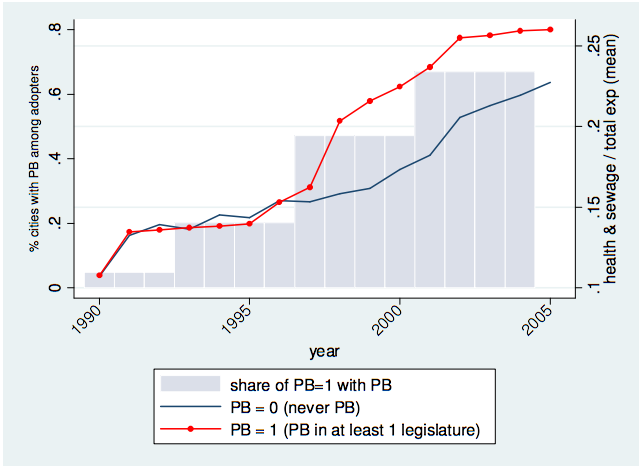When it comes to the relationship between participatory institutions and development outcomes, participatory budgeting stands out as one of the best examples out there. For instance, in a paper recently published in World Development, Sonia Gonçalves finds that municipalities that adopted participatory budgeting in Brazil “favoured an allocation of public expenditures that closely matched the popular preferences and channeled a larger fraction of their total budget to key investments in sanitation and health services.” As a consequence, the author also finds that this change in the allocation of public expenditures “is associated with a pronounced reduction in the infant mortality rates for municipalities which adopted participatory budgeting.”

Evolution of the share of expenditures in health and sanitation compared between adopters and non-adopters of participatory budgeting (Goncalves 2013).
Now, in an excellent new article published in Comparative Political Studies, the authors Michael Touchton and Brian Wampler come up with similar findings (abstract):
We evaluate the role of a new type of democratic institution, participatory budgeting (PB), for improving citizens’ well-being. Participatory institutions are said to enhance governance, citizens’ empowerment, and the quality of democracy, creating a virtuous cycle to improve the poor’s well-being. Drawing from an original database of Brazil’s largest cities over the last 20 years, we assess whether adopting PB programs influences several indicators of well-being inputs, processes, and outcomes. We find PB programs are strongly associated with increases in health care spending, increases in civil society organizations, and decreases in infant mortality rates. This connection strengthens dramatically as PB programs remain in place over longer time frames. Furthermore, PB’s connection to well-being strengthens in the hand of mayors from the nationally powerful, ideologically and electorally motivated Workers’ Party. Our argument directly addresses debates on democracy and well-being and has powerful implications for participation, governance, and economic development.
When put together, these findings provide compelling evidence for those who – often unfamiliar with the literature – question the effectiveness of participatory governance institutions. Surely, more research is needed, and different citizen engagement initiatives (and contexts) may lead to different results.
But these articles also bring another important takeaway for those working with development and public sector reform. And that is the need to consider the fact that participatory institutions (as most institutional reforms) may take time to produce desirable/noticeable effects. As noted by Touchton and Wampler:
The relationships we describe between PB and health and sanitation spending, PB and CSOs, and PB and health care outcomes in this section are greater in magnitude and stronger in statistical significance for municipalities that have used PB for a longer period of time. Municipalities using PB for less than 4 years do exhibit lower infant mortality rates than municipalities that never adopted PB. However, there is no statistically significant difference in spending on health care and sanitation between municipalities using PB for less than 4 years and municipalities that never adopted the program. This demonstrates the benefits from adopting PB are not related to low-hanging fruit, but built over a great number of years. Our results imply PB is associated with long-term institutional and political change—not just short-term shifts in funding priorities .
If throughout the years participatory budgeting has produced evidence of its effectiveness on a number of fronts (e.g. pro-poor spending), it is only 25 years after its first implementation in Brazil that we start to see systematic evidence of sound development outcomes such as reduction in infant mortality. In other words, rushing to draw conclusions at early stages of participatory governance interventions may result in misleading assessments. Even worse, it may lead to discontinuing efforts that are yet to bear fruit in the medium and longer terms.

